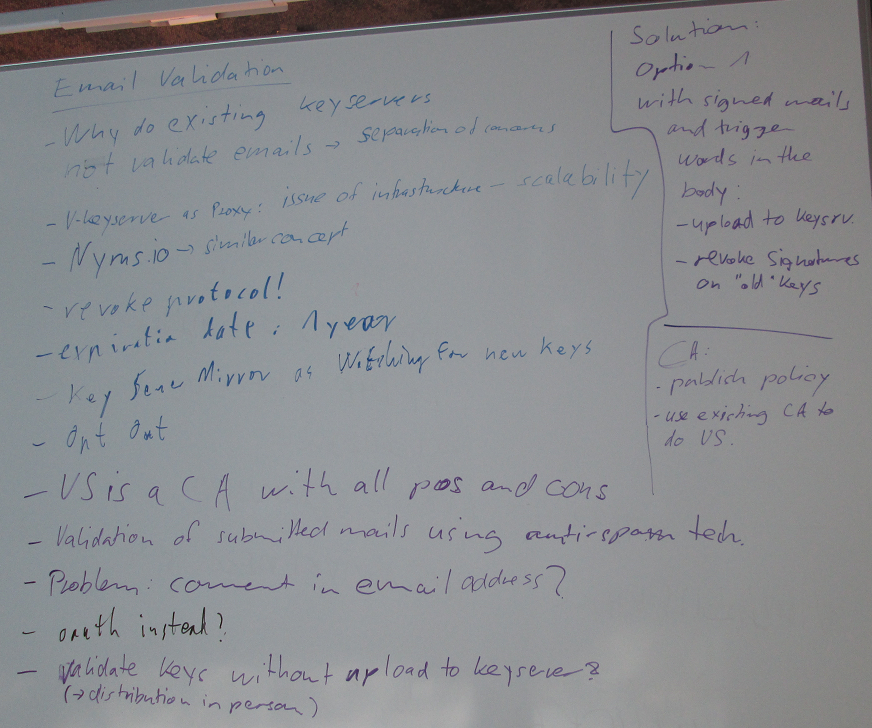Summit 2015-12 Notes - Email Validation
Workshop at 2nd OpenPGP Email Summit, Dec 2015 run by Nicolai Josuttis. Follow-Up: OpenPGPEmailSummit201607/EmailValidation.
ApproachPermalink
With this approach we want to establish a quick backward compatible solution to validate email addresses of UIDs of OpenPGP keys.
This would help to solve two major problems we have:
- People can currently easily upload faked keys (and they do)
- We have a lot of “moldered” keys (old keys not for any usage anymore)
The key approach is:
- Define a standard signature format to signal successfull email
validation
- The standard format would require to:
- let the signature expire after 1 year
- having a “signature notation” defining when/how/what was validated as JSON value
- having a link to the validation policy of the validation server
- The standard format allows email clients to process them
accordingly
- E.g.:
- Prefer or highlight keys that hav any such signature
- In the UI show a list of who validated the email address
- Signal trust for a UID if it is signed by one or more (specific) validating servers
- E.g.:
- But even existing email clients can benefit from them:
- According to the WebOfTrust a user can grant trust (and therefore priority) to emails with specific signatures
- The standard format would require to:
- Establish some initial validation servers to perform that
validations on request
- To validate: Sends email to email address in UID encrypted with the key to ensure that the one who confirms has the private key
- Request might be implicitly triggered by email clients or
explicitly triggered by sending an email
- request shall be an email
- to ensure that the request is signed by the owner
- part of the email can be two hints:
- “upload to key server”
- “revoke signatures on old keys”
- request shall be an email
- Validation can be done asynchonously (not hindering immediate use of a new key)
Key properties of the approach are:
- No change of existing key server infrastructure or protocol
- Existing email clients can use it
- Fast establishment possible when email clients (e.,g. enigmail) support this in a new version
- The standard format might also be used by email providers, who provide both email address and keys (e.g. Google)
- Yes, this is a CA-like approach
- Careful selection of initial CAs
- Options: Current SMime CAs, trusted organizations, … ?
- This is no perfect solution, but it makes faking keys a lot
harder and easier to detect
- Solution against trolls not against secret services
- But very important for the acceptance of OpenPGP because the naive user does not understand, why emails are not validated
Open issues:
- How to ensure that the validation request is triggered by the owner
of the key?
- To avoid spam DOS
- Answer: explicit request by email client that supports this approach or by user sending a specific email.
- Who runs a first validation server?
Documents / Links / ResourcesPermalink
Initial Proposal: https://lists.gnupg.org/pipermail/gnupg-users/2015-July/053971.html
Slides: EmailValidation20151207.pdf
Whiteboard 2nd OpenPGP Email Summit:

FeedbackPermalink
Please send comments and feedback to Nico Josuttis, nico(at)enigmail.net (Fingerprint: CFEA 3B9F 9D8E B52D BD3F 7AF6 1C16 A70A F92D 28F5)